|
Carlo Domeniconi
List of works with descriptions by the composer |
| |
|
| |
Copyright © Carlo Domeniconi 2009 - 2010
Translation: David John
Updated and corrected January 2010.
|
|
Download this list as:
Acrobat document (PDF)
Word document (RTF)
Documents open
in a new window.
Updated January 2010
Also available in German
Links to publishers of
Carlo Domeniconi's works
can be found
on the links page.
Carlo Domeniconi CDs
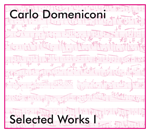
Selected Works I CD
Further details
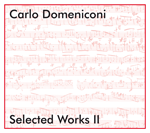
Selected Works II CD
Further details
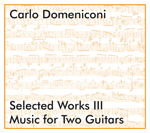
Selected Works III CD
Further details
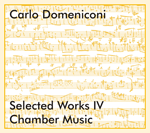
Selected Works IV CD
Further details
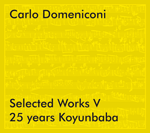
Selected Works V CD
Further details
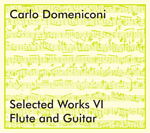
Selected Works VI CD
Further details
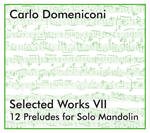
Selected Works VII CD
Further details
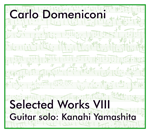
Selected Works VIII CD
Further details |
Opus 1 Hommage à J. Rodrigo
(Berlin, 1968) 14 min.
Sonata for 2 guitars. 3 movements. Harmonically influenced by the sound-world of Spanish composer Joaquin Rodrigo. Recorded by the Duo Bergerac (Thorofon). Published by Verlag Michael Haas, Berlin.
Opus 2 Orient Express
(Berlin, 1973) 4 min.
Solo guitar. An oriental introduction follows a very rhythmic and virtuous continuum, imitative of the famous Orient Express train. Edition Margaux, Berlin.
Opus 3 Nile
(Berlin - Hamburg, 1974) 16 min.
There are 2 versions of this piece. The first as improvisation with bass clarinet, marimba, guitar, double bass and 2 drummers. Released on the LP ”Irisation” (Thorofon). The second version, also improvised, for solo guitar. Recorded by the composer for the LP “Nile” (EMI). There are no scores for either of these arrangements.
Opus 4 Seven Compositions
(Berlin, 1974) 18 min.
Solo guitar. 7 pieces in the South American style. Recorded by the composer for the LP “Nile“ (EMI). The most well-known piece is ”Samba do contrabandista“. Published by Rüssel Records, Hamburg.
Opus 5 Moonlights
(Berlin, 1975) 12 min.
Solo guitar. 6 small preludes. Predominantly elements from impressionistic and expressionistic music, as well as light jazz elements. First publication. Recorded by the composer on the LP ”Luci e Tenebre” (PODIUM, Hamburg). Verlag Bote & Bock, Berlin, now Boosey & Hawkes.
Opus 5a Sonido
(Berlin, 1975) 6 min.
A short piece, which always works with the same sound, creating a kind of tonal obsession. Sonido is Spanish for sound. It appears on the composer’s 2005 CD “Selected Works II”.
Opus 6 Concertino in FA (No. 1)
(Istanbul, 1977) 12 min.
Guitar and orchestra. Written and performed as a commission from the German public broadcaster Norddeutsche Rundfunk. It was the composer’s first guitar concerto; and his first attempt at a large-scale chamber music composition. Now withdrawn by the composer.
Opus 7 Gli Spiriti
(Istanbul, 1978) 7 min.
Solo guitar. 2 movements (slow, fast) which flow into each other. Inspired by the Argentinian spirit. Here, the folk music (fast) is used as collage. Well-known phrases appear ghost-like (Spiriti). Pauses and sudden appearances shape the piece. The second movement imitates a distant party which one approaches and enters. Recorded by the composer for the CD “Selected Works II”. Published by Verlag Michael Haas, Berlin.
Opus 8 Concertino Sudamericano
(Istanbul, 1978) 9 min.
Guitar, strings, 1 flute and percussion. Written and recorded as a commission from the German public broadcaster Norddeutsche Rundfunk. Musically oriented on Andean music. This second small concerto consists of 5 short movements. Withdrawn by the composer.
Opus 9 Fantasia di luci e tenebre
(Istanbul, 1978) 5 min.
Solo guitar. This piece uses the form of the old Italian Fantasia. Light and darkness (duality principle) alternate. Recorded by the composer for the LP “Luci e tenebre” (PODIUM, Hamburg), and later by Martin Pramanik (Kreuzberg Records). Verlag Bote & Bock, Berlin, now Boosey & Hawkes.
|
|
| Carlo Domeniconi - list of works |
 |
|
Op. 10 - 19 |
|
|
Opus 10 El Mato
(Istanbul, 1978) (No. 2) 18 min.
The composer’s first large concerto for guitar and orchestra. As the title suggests, this piece is about the sounds of the tropical jungle. Withdrawn by the composer.
Opus 11 Quaderno Brasiliano
(Berlin, 1980) 12 min.
Solo guitar. A collection of short bossa novas. Originally a didactic piece. Recorded by the composer for the LP “Luci e Tenebre” (PODIUM, Hamburg). Verlag Bote & Bock, Berlin, now Boosey & Hawkes.
Opus 12 Suite Sudamericana
(Berlin, 1980) 10 min.
Solo guitar. A collection of short bossa novas published by the Hamburg publisher Peter Meyer, originally together with ”Quaderno Brasiliano”.
Opus 13 Meta-amor-phose
(Berlin, 1980) 6 min.
Solo guitar. Almost atonal sound language, variations form. The influence of classes with Heinz-Friedrich Hartig is obvious. Withdrawn.
Opus 14 Sonata in tre movimenti (Sonata in three movements)
(Berlin, 1981) 12 min.
2 guitars. As the title says: 3 movements. Dedicated to the Mexican composer M. M. Ponce, whose style and harmony is also imitated (neoclassical–impressionistic). Published by Edition Margaux, Berlin, and recorded by Duo Tedesco.
Opus 15 Variationen über ein anatolisches Volkslied (Variations on an Anatolian folk song)
(Berlin, 1982) 10 min.
Solo guitar. Based on an Anatolian folk song by the blind singer Asık Veysel. Recorded by the composer for the LP “Luci e tenebre” (PODIUM, Hamburg). Made a standard by David Russell, it has since been played and recorded by innumerable guitarists. Verlag Bote & Bock Berlin, now Boosey & Hawkes.
Opus 16 Suite in modo antico
10 min.
Suite in 5 movements: Overture, Allegro, Minuetto, Sarabanda, Giga. The 3 dances have a common theme. The ideal of this composition is ”Le tombeau de Couperin” by Maurice Ravel. Recorded by the composer for the LP “Koyunbaba“. Other guitarists have also played this piece, including Carlo Marchione, who has performed it at several concerts since 1998. Published by Verlag Peter Mayer, Hamburg.
Opus 17 Passacaglia & Fuge
(Berlin, 1985) 8 min.
Solo guitar. Neoclassical style. The theme is baroque, the variations of the Passacaglia free themselves increasingly from the neo-baroque style. Recorded by the composer on the LP “Koyunbaba”. Published by Verlag Bote & Bock, Berlin, now Boosey & Hawkes.
Opus 18 Introduktion & Fandango
(Berlin, 1985) 7 min.
Two guitars. Neoclassical style. Written for and first performed by Sonja Prunnbauer and Carlo Domeniconi at the guitar festival “Hamburger Gitarrentagen 1985”. It was later performed by Laurie Randolph and Erich Hoyer at the Spandau Guitar Festival. Published by Edition Michael Haas, Berlin. |
|
Opus 19 Koyunbaba
(Gümüslük, Turkey - Berlin, 1984 - 85) 15 - 20 min.
Solo guitar. This started as an improvisation which gradually took on form. The guitar tuning (scordatur) is CIS, GIS, cis, gis, cis, e.
A first "final" version was recorded by the composer in 2008 for the LP of same name, from which the musical score also originated. A later recording, also by the composer, was made in 1991 in Ankara, Turkey, together with the concerto for saz, guitar and orchestra (Berlinbul).
These two recordings have been re-released with a new third recording by the composer (Berlin, 2009) on the CD “Selected Works V”.
Many other musicians have played and recorded this piece. Once again, David Russell was the first, followed by many others, including Martin Pramanik, Costas Cotsiolis, John Williams, William Kanenegiser, Antigoni Goni and Masayuki Kato. It has become one of the best known works for guitar of the last 15 years. Published by Edition Margaux, Berlin. |
|
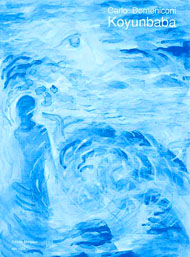
Koyunbaba
sheet music cover |
| Carlo Domeniconi - list of works |
 |
|
Op. 20 - 29 |
|
|
|
Opus 20 Preludes (24)
(Berlin, 1986) 38 min.
Solo guitar. 24 simple pictures which each represent a different aspect of the guitar. Very easy to intermediate short pieces which have become very popular with students as they combine a relatively high degree of musical expression with a very low technical level. The styles are very varied. Twelve of these preludes were recorded by the composer for the CD "Selected Works II". Edition Ex Tempore, Berlin.
Opus 21 Notturno (Homenaje a Andres Segovia)
(Berlin, 1985) 5 min.
Solo guitar. A short night piece, reminiscent of the soundscapes of A. Segovia. Late-romantic Spanish. A first version appeared in the anthology ”Modern Times“ (R. Brightmore), published by Chanterelle Verlag.
|
|
|
Opus 22 Three Studies for the Spirit
(Berlin, 1985) 13 min.
Solo guitar. These three études present technical as well as musical hurdles. The first, ”Time and Space”, wanders from European classicism into the present day world of the Far East. (Mixed techniques in connection with arpeggios and other special techniques.) The second, ”The Chinese”, is mainly a tremolo study. Totally Far Eastern. The third, “Hommage à Olivier Messiäen”, returns to the western world. This piece is based on an eight-tone scale. The name originated from a conversation with David Russell (1986) in the composer’s house in Heilbronnerstrasse, Berlin.
Recorded by the composer for the CD “To play or not to play“ (Classic Studio Berlin, now AMA Verlag). They have been performed by Martin Pramanik, Marco Socías, Carlo Marchione and Dale Kavanagh. The “Studies for the Spirit” were obligatory pieces in the Frechen Guitar Competition (1994). Edition Margaux, Berlin.
Opus 23 Music for the Little Prince (Homage to Antoine de St. Exupery)
(Berlin, 1989) 12 min.
Solo guitar. Original version. Short impressionistic and descriptive pieces. Verlag Michael Haas, Berlin.
Notes from the booklet of the CD "Selected Works II" on which this work appears:
These little musical aphorisms depict with great brevity the main scenes from the novel of the same name. In addition there is something akin to a leitmotiv which does not depict the little prince, but rather his relationship to the world. The motif of the little prince (First Movement) is picked up at the end (Transformation), combined with the motifs of the snake and the rose. The return to the stars is suggested at the end of the fox motif.
Opus 23a Music for the Little Prince (Homage to Antoine de St. Exupery)
(Berlin, 1989 - 1993) 20 min.
Flute solo. Second version (1993), extended by a few movements. Several flautists have performed this work. The first was Monika Ritter von Hattingberg, to whom this piece is dedicated. It was later often used in schools. Edition Margaux, Berlin.
Opus 24 Raga
(Berlin, 1986) 7 min.
Solo guitar. There is no score for this work as it emerged from improvisation. The title “Raga” should not be taken literally, since it has little to do with Indian music. Actually, it is an arpeggio étude with long breaths. Preliminary study for all later works with an Indian character: Gita, Concerto No. 6, Prana.
Opus 25 Tryptichon (Trilogy)
(Berlin, 1986) 15 min.
Solo guitar. This piece also began life as an improvisation, and was only later transcribed. From this moment, the piece became a three-parter. The first movement “Calata” is powerful, the second “Canto” very lyrical and oriental, and the third “Ragtime” again emotional. There is also an extended version of the second movement, entitled “Monodia”. This was recorded by the composer for the CD ”Dhwani” (out of print). The composer also recorded the first two first movements for a cassette series “Festival of world cultures”. In 1999 Dale Kavanagh’s interpretation of the complete work was published by Hänssler Verlag. Edition Ex Tempore, Berlin.
Opus 26 Gita
(Berlin, 1986. New version 2002) 16 min.
Solo guitar. The Sanskrit name “Gita” is an abbreviation of “Bhagavad Gita” which means “sacred song“. The Indian influence is heard only here and there. Gita began as an improvisation and was later transcribed in an older and a newer arrangement. The piece contains very refined techniques, some of which are impossible to score. Available only privately.
Opus 27 Concerto in tre movimenti (No. 3)
(Berlin, 1987) 22 min.
Guitar and strings. This concerto was written for Sebastiao Tapajos. Unfortunately, no performance came about, although Tapajos had already played his part. (In the present version, a performance is not advised, as the string part is too difficult.) The guitar has a very dominant role. Withdrawn by the composer.
Opus 28 Naturgeister (Nature spirits)
(Berlin, 1988) 8 min.
2 guitars. Originally written at the request of a Berlin concert organizer. However, the work was not delivered. The 4 movements represent the 4 elements air, fire, earth and water. This work has often been played by Silvia Ocougne in duet with the composer, and recorded for the CD ”Water Music“. The composer’s first published work. Edition Margaux, Berlin.
Opus 29 Concerto di Berlinbul (No. 4)
(Berlin, 1987) 24 - 26 min.
Saz (baglama), guitar and chamber orchestra. Concerto in 3 movements. Commissioned by the Berlin Senate for the celebration “750 Years Berlin”. It was performed in the same year in the Berlin Philharmonic (Adil Arslan, saz; Carlo Domeniconi, guitar). Further performances in the Berlin Academy of the Arts and at the World Anthroposophical Convention in Helsinki. The work of the same soloists was later recorded in Ankara, Turkey on CD (RAKS). In 2002 it was performed in Istanbul and Ankara by Senfonietta Istanbul, conducted by Francisco de Galvez, with Kemal Dinc on the saz. Verlag Neue Musik. |
|
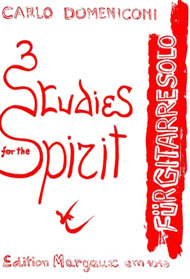
Three Studies for the Spirit
sheet music cover |
| Carlo Domeniconi - list of works |
 |
|
Op. 30 - 39 |
|
|
|
Opus 30 Sonatina Mexicana
(Berlin, 1986) 12 min.
Flute and guitar. This folk piece was written in an evening at the composer’s apartment in Heilbronnerstrasse, Berlin, as a concentration exercise. A loud party was going on upstairs. The exercise consisted of writing a “small serenade” without the aid of an instrument, as a distraction from the noise. Sonatina Mexicana has often been performed by Monika Ritter von Hattingberg in duet with the composer. It was later also recorded by other musicians. Edition Margaux, Berlin.
Opus 31 Concerto No. 5
(Berlin, 1987) 25 min.
Guitar and large orchestra. Commissioned by the “Hofer Gitarrentage“ festival, where it was performed by the composer with the Hofer Symphonikerns. This piece, the fifth concerto, has a theme of 5 notes, has 5 parts, each of which is separated by a cadenza. Verlag Neue Musik.
Opus 32 Ellylldan
(Berlin, 1988) 12 min.
Solo guitar. 3 movements. Ellylldan is the Welsh version of the tradition of Will-o'-the-wisps; mysterious creatures (elves) who inhabit marshland and mischievously mislead travellers. The piece is predominantly surreal and fantastic, a kind of midsummer nocturnal ecstasy. The third movement could represent a distant variation of the “Follia”. Recorded by the composer for the CD “To play or not to play“. Ellylldan won second prize in the “Reyna Sophia” composition competition in Madrid (1993).
Opus 33 Fünf Stücke für Violoncello und Gitarre (Five pieces for cello and guitar)
(Berlin, 1988) 8 min.
Cello and guitar. Written for the Brazilian cellist Matias de Oliveira Pinto and the guitarist and composer Jaime Zenamon. Expressionistic style combined with Brazilian rhythms. Edition Margaux, Berlin.
Opus 34 Avalon
(Berlin, 1987) 17 min.
Solo guitar. This piece was inspired from the Celtic legend of King Arthur. A long piece whose parts flow into one another. It is dedicated to the composer Dafydd Llywellyn. Premiered by the composer at the 60th birthday of the harpsichord player Gerhard Kastner in a church in Charlottenburg, Berlin. Several performances followed in Germany and England.
Opus 35 Canto Profondo
(Berlin, 1989) 7 min.
Cello solo. A hymn-like work dedicated the Brazilian cellist Matias de Oliveira Pinto, who premiered it.
|
|
|
Opus 36 Prana
(Berlin, 1989) 8 min.
2 guitars. Prana is Sanskrit for breath or life-energy. This composition was commissioned by the Berlin guitarist Frank Hill, to be performed during a tour of India. Later, it was also included by Silvia Ocougne in her programme in duet with the composer, and recorded for the CD “Dhwani” (out of print), and for the CD “Water music”. Score available from Edition Margaux, Berlin.
Opus 37 Sonata a Due
(Berlin, 1989) 11 min.
Flute and guitar. Sonata in 1 movement, which nevertheless consists of 2 different sections which flow into one another. Difficult to classify stylistically. Free counterpoint, bordering on atonality; simultaneously the piece never loses a tonal core. It was first performed by Monika Ritter von Hattingberg and the composer. Later it became part of the repertoire of the Browning-Gilchrest Duo (New York) and performed in the Carnegie Hall. Further CD recordings by Pat Bianculli and Kathy McDonald; and by the composer with Thea Nielsen for “Selected Works VI”. Edition Margaux, Berlin.
Opus 38 Sette immaginazioni (Seven imaginings)
(Berlin, 1989) 14 min.
Cello and guitar. 7 short and diverse pieces, often performed by Matias Oliveira de Pinto and the composer, and recorded by them for the CD “Selected Works IV”.
Opus 39 Klangbilder (Sound pictures) (24)
(Berlin, 1989) 30 min.
Solo guitar. A didactic work, which sets the task of attaining the highest possible musical content with very little technical effort. Available in 2 volumes from Edition Margaux, Berlin. |
|
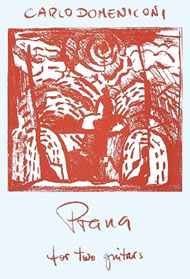
Prana sheet music cover |
| Carlo Domeniconi - list of works |
 |
|
Op. 40 - 49 |
|
|
|
Opus 40 Positionsetüden (Position études) (24)
(Berlin, Ringwood, 1989) 40 min.
Solo guitar. A didactic work, for practicing the sound possibilities on the guitar in the first 12 positions. 2 études are assigned to each position, one fast and the other slow. Partly very high musical and technical level. Available only privately.
Opus 41 Ein Sonntag auf dem Lande (A Sunday in the country)
(Berlin, 1989) 15 min.
3 guitars. Written originally for the Amsterdam Guitar Trio, who premiered the work. A humorous, poetic piece which mocks rural conventions: Waking of the birds, matrimonial strife with radio, the church service, Sunday lunch, boring visit, Angelus, secret meeting at the well, television evening with remote control, the falling asleep of the birds. Later, this piece was also performed by Silvia Ocougne, Stefan Samp and the composer at an event in the Forum Kreuzberg, Berlin, entitled “Ko(s)mische Musik “ (Co(s)mic Music). It was recorded in 2000 by Nora Buschmann, Marco Socías and the composer.
Opus 42 Vier Stücke für vier Gitarren (Four pieces for four guitars)
(Berlin, 1989) 11 min.
4 guitars. Abstract sound models with unusual techniques. Very often each guitar has an individual task so that one can experience multiple layers of sound. Often performed by the Berliner Gitarrenquartett. Edition Margaux, Berlin.
|
|
|
Opus 43 To play or not to play
(Berlin, 1990) 7 min.
Solo guitar. Based on an old guitar piece by Gaspar Sanz (“Zarabanda al Ayre Espanol”, around 1700). Tonics and dominants are intentionally allowed to stand above each other (which more often happens unintentionally!), and thereby open a door into a new world. The old Zarabanda experiences completely new aspects and fully frees itself of its old form. At the end the piece dissolves into nothingness and the music continues in silence. One reaches a condition where almost any sound could fit, or even silence becomes sound. Whether one plays (on) or not... that is the question!. Edition Margaux, Berlin.
Opus 44 Le cittá invisibili (Invisible cities)
(Berlin, 1989) 42 min.
2 guitars. Written for the Duo Tedesco. Based on the novel of the same name by Italo Calvino. The traveller Marco Polo describes to the great ruler Genghis Khan the various cities that he has seen on his journies. Marco Polo invents fantasy names and pictures, and embellishes them marvellously. But in the end he is always describing Venice. Silvia Ocougne, in duet with the composer, has performed this demanding work very frequently.
Opus 45 Anatolia
(Berlin, 1990) 20 min.
4 guitars. Commissioned by the Los Angeles Guitar Quartet (LAGQ), who premiered the work. It later became a regular repertoire piece of the Berliner Gitarrenquartett. It is based on the Anatolian folk song “Dostum” (My friend).
Opus 46 In Sospeso
(Berlin, 1990) 22 min.
Trio for flute, cello and guitar. Each instrument is introduced individually. Then the piece goes through very varied phases of interplay. Premiered and thereafter often performed by Monika Ritter von Hattingberg (flute), Matias de Oliveira Pinto (cello) and the composer (guitar).
Opus 46a Turning (Hommage à Mevlana)
(Berlin, 1990) 4 min.
Flute, cello and guitar. Light oriental. Premiered by Monika Ritter von Hattingberg, Matias Oliveira Pinto and the composer, and recorded by them in 2009 for the CD “Selected Works IV”.
Opus 47 Dhvani (Concerto No. 6)
(Berlin, 1990) 25 min.
2 guitars and strings, bass flute, celesta, timpani. Stylistically, this concerto is a modern raga. Performed on a tour of Germany by Silvia Ocougne and the composer, accompanied by the Orchester-Akademie-Hamburg, conducted by Elmar Lampson. 8 concerts and the live CD “Dhvani” resulted. (Now out of print).
Opus 48 Trancendence
(Berlin, 1990) 10 min.
Solo violin, strings, tubular bells and harp. It was recorded together with Opus 47. Old music transcended into the new age. |
|
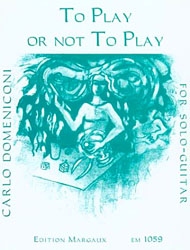
To play or not to play
sheet music cover |
Opus 49 Sindbad, ein Märchen für Gitarre solo (Sinbad, a fairy tale for solo guitar)
(Berlin, 1991) 95 min.
Solo guitar. Sinbad tells the famous tales from “1001 nights”. Divided into 3 cycles, each consisting of 7 pieces. Stylistically very variable, and in part very highly complex. During the 21 movements, the guitar is tuned gradually in 12 different tunings; this is relieved, however, in that the tuning changes always (with one exception) involve just one string, and a semitone. It was recorded by the composer for the double CD “Sindbad” (Kreuzberg Records), and performed very frequently. Later also performed by Marco Socías. The work was often performed with Eurythmy (Birgit Hering). Edition Margaux, Berlin. |
|
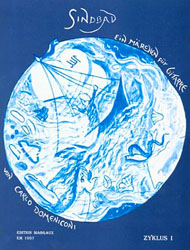
Sindbad sheet music cover |
| Carlo Domeniconi - list of works |
 |
|
Op. 50 - 59 |
|
|
|
Opus 50a Fantasia d'oriente e d'occidente
(Berlin, 1991) 12 min.
Two guitars. Commissioned by Odair and Sergio Assad. Very difficult virtuoso piece. Dissonant, but nevertheless built on old forms. It was recorded for CD by Dale Kavanagh and Thomas Kirchoff (Amadeus Duo).
Opus 50b ... un poco di tempo
(Berlin, 1991) 6 min.
Bass flute or recorder. Modern sound language. Intermediate level.
Opus 50c Cercando
(Berlin, 1991) 12 min.
Recorder and guitar. Commissioned by the Baseler Konservatorium. As the title says: the piece seeks its own form. Played as a final exam piece.
|
|
|
Opus 50d Minyo
(Berlin, 1990) 5 min.
Solo guitar. Commissioned by Gendai Guitar (Tokyo). Variations on a Japanese folk song. Recorded by the composer for the CD “To play or not to play”. Edition Margaux, Berlin.
Opus 50e Gesualdo
(Berlin, 1991) 4 min.
Solo guitar. Dark, chromatic. Recorded by the composer for the CD “To play or not to play”. Edition Margaux, Berlin.
Opus 50f Sonatina turca
(Berlin, 1991) 12 min.
2 guitars. In the Turkish style with extremely heightened, dissonant modality. 3 short movements.
Opus 51 Medium Sweet Guitar Concerto (No. 7)
(Berlin, 1991) 14 min.
Solo guitar, strings, flute, clarinet, bassoon. The idea for this title came from the Turkish tradition of drinking coffee either bitter, semi-sweet, or sweet. The semi-sweet variation has something of both options. And so it is with this concerto: it touches the bitter as well as the sweet sides of life. This concerto was recorded by the composer. CD available from RAKS (Istanbul). Musical scores published by Verlag Neue Musik, Edition Margaux, Berlin.
|
|
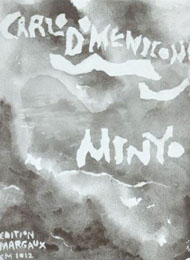
Minyo
sheet music cover |
Opus 51a Schnee in Istanbul - Schneeschmelze (Snow in Istanbul - melting snow)
(Istanbul, 1991) 10 min.
Solo guitar. 2 small, poetic pieces drawn from real experience. The heavy snow drifts over the mosques of Istanbul and the breaking through of spring sunshine. This work was recorded by the composer for the CD “To play or not to play”. Edition Margaux, Berlin.
Opus 51b Incontro
(Ankara, 1991) 7 min.
Solo guitar. Incontro is Italian for meeting. This piece documents the composer’s first meeting with the Spanish guitarist Marco Socías. It became a standard in his programme.
Opus 52a Hommage à Jimi Hendrix
(Berlin, 1991) 14 min.
Solo guitar. A tombeau, so to speak, an epitaph. Sometimes it seems as if Jimi himself is thinking over his short life. Transformed quotations from his guitar passages are no rarity in this piece. Since 2006 in the repertoire of Pavel Steidel. Edition Margaux, Berlin.
Opus 52b Outremer
(Berlin, 1992) 14 min.
Marimba and guitar. This piece is dedicated to the great rock star Tim Buckley, who died young. The title “Outremer” means overseas.It was written for Thomas Müller-Pering, who premiered the work at the Spandauer Festival (Berlin). He later recorded it on CD with his duo partner (?).
Opus 53a Mirando las estrellas
(Berlin, 1992) 10 min.
Flute and harp. Commissioned for a concert in the West Berlin planetarium. Based on Andean music.
Opus 53b Drei Stücke für Violoncello solo (Three pieces for solo cello)
(Berlin, 1992) 10 min.
Solo cello. First performed by Matias de Oliveira Pinto in the gallery “Mother Fourage”, Wannsee , Berlin.
Opus 53c La notte rubata
(Berlin, 1992) 10 min.
String trio (Vl. Vla. Vc.). It means “the stolen night”. 3 movements. It was performed twice by the trio “Quodlibet” in the Saalbau Neukölln (Berlin).
Opus 53d Suoni di Stromboli
(Berlin, 1992) 11 min.
Solo contrabass. Sounds of the Stromboli volcano.
|
|
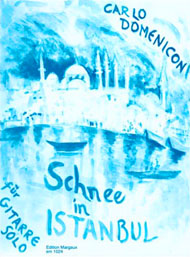
Schnee in Istanbul
sheet music cover
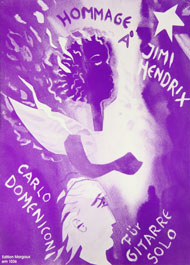
Hommage � Jimi Hendrix
sheet music cover
|
Opus 54a Malamatina
(Berlin, 1992) 11 min.
Guitar quartet and a bottle of retsina. Four musicians play a Greek sirtaki and clink their glasses together at particular times. Gradually, the musicians appear to become drunk. False notes.. until total breakdown, are fixed in the score. However, the score also provides for a happy end. Edition Margaux, Berlin.
Opus 54b Circus music
(Berlin, 1992) 15 min.
2 guitars. Acoustic pictures of a circus. The Argentinian knife-thrower, the Spanish rider on Greek horses, the waxworks, the Cossaks and the wonder-voice of the Ural duck race Plik, the Andean flea, the fakir who slips through a keyhole, the orchestra says good night. It was recorded by Silvia Ocougne and the composer for the CD “Water music”. Circus music enjoys enormous popularity, and has been performed in many countries by numerous duos. Edition Margaux. Berlin.
Opus 54c Circus music
(Berlin, 1997) 15 min.
4 guitars. A reworked treatment of Opus 54b.
Opus 55 Contemplacao
(Berlin, 1992) 11 min.
3 cellos. Performed in the Otto Braun Saal (Berlin). Rhythmic and melodic / contemplative piece with a Brazilian character.
Opus 56a Krysea Phorminx
(Berlin, 1992) 11 min.
Solo guitar. Written for the Greek guitarist Eleftheria Kotzia, who lives in London. The golden lyre of Apollo. Just as the golden lyre of Apollo mediates between heaven and earth, between the Muses and mortals, Krysea Phorminx alternates between heavenly and earthly phases. This piece is inspired by, and has as its theme, the oldest fragment of music in Greek culture, the Ode by Pindar (522-488 BC).
Appears on the CD "Selected Works I".
Opus 56b Cinque pezzi in stile classico (Five pieces in classical style)
(Berlin, 1992) 12 min.
Solo guitar. 5 medium difficult pieces in the classical style. By "classical" I don't mean the stylistic era, but rather the way in which I recollect the "classical guitar". For this reason all five pieces have, if you will, a different style: the first recalls to some extent F. Sor; the second is an old counterpoint; the third could have been by M.M. Ponce; the fourth is a mix of renaissance motifs and (. ?) and the fifth reminds me of Abbey Road . but then again, it doesn't. Published by Edition Margaux, Berlin.
Appears on the CD "Selected Works II".
Opus 57 Narnia
(Berlin, 1993) 40 min.
Violin, cello and 2 guitars. After the children’s story by the Irish author C.S. Lewis. 4 movements. Commissioned by Duo Tedesco, and performed by them twice (Konzerthaus Berlin, Schweinfurther Festival).
Opus 58 Immaginationen (24)
(Berlin, 1995) 35 min.
Solo guitar. A didactic work which works very well on stage. Played frequently by the composer, later also by Marco Socías.
Opus 59 Des Fisches Nachtgesang (The fish's serenade)
(Berlin, 1992) 11 min.
Quartet for flute, guitar, double bass and percussion. Humoresque. Commissioned by the Leipzig Aquarium. After the famous poem of the same name by Christian Morgenstern. There is a later version for 4 guitars.
|
|
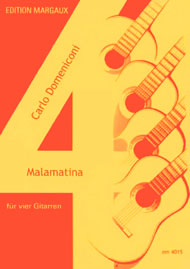
Malamatina
sheet music cover
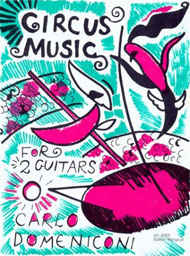
Circus music
sheet music cover
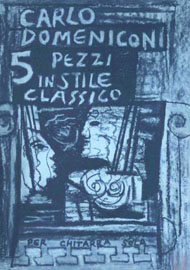
Cinque Pezzi in Stile Classico
sheet music cover |
| Carlo Domeniconi - list of works |
 |
|
Op. 60 - 69 |
|
|
|
Opus 60 Dervish songs
(Berlin, 1993) 15 min.
Mezzo soprano and guitar. Old Anatolian Dervish songs translated into English by Sevgi Sanlı. Recorded by �zlem Kaveller and the composer on CD in 2002 (Kreuzberg Records), and for "Selected Works IV".
Opus 61a Kleine Klavierstücke (Small piano-pieces) (12)
(Berlin, 1993) 20 min.
Solo piano. Didactic work (easy).
Opus 61b Sphäre (Sphere)
(Berlin, 1993) 5 min.
Solo piano. Minimal music.
Opus 62 Galgenlieder (Gallows songs)
(Berlin, 1993) 20 min.
Bass baritone and guitar. Humoresque. Song cycle after the poet Christian Morgenstern with a prelude and four interludes.
Opus 63 Taht
(Berlin, 1993) 11 min.
Solo cello. Sanskrit word signifying the concentration of the will on an action.
Opus 64a Robin Hood suite
(Berlin, 1993) 12 min.
Solo guitar. Youth album. It tells of the adventures of the famous folk hero in short musical pictures. Mainly in an old folk style.
Notes from the booklet of the CD "Selected Works II " on which this work appears:
Here music is used to tell a little story. Robin Hood's friends, living scattered in the forest, come together at the sound of the forest horns. They live in the Green Wood with Robin, who is by turn jovial and gloomy, in stark contrast to his easy-going friend Little John. Friar Tuck, the hermit, is a kind of spiritual leader of the group.
There is a wedding which is celebrated by the whole tribe; Robin and Marian marry in the forest chapel. An archery tournament is held in a nearby town, and although it would be foolhardy for Robin's friends to take part, they do so in disguise and prove to be the best archers.
The king is secretly well-disposed towards Robin and visits him in the forest in order to give him what support he can. By contrast, the tyrannical Guy of Gisborne devises a trap in which several of Robin's entourage, including his wife Marian, are killed.
Robin is exhausted and does not want to continue the fight. He withdraws to the castle of his relation Richard-at-Lea. But with time his friends convince him to resume the fight. This gives him a new will to live ... and soon the forest horns are heard again.
Opus 64b La Battaglia
(Berlin, 1993) 12 min.
Solo guitar. “Battaglia” is a Renaissance musical form. This piece was written for David Russell. It describes the meeting of the English fleet with the Spanish Armada. David is half Scot, half Spaniard. In this case, one decides not to fight.
|
|
|
Opus 64c Water music
(Berlin, 1990) 10 min.
2 guitars. This simple suite was very often played by Silvia Ocougne and the composer and was recorded for the CD “Water music” (Kreuzberg Records, Berlin). Published by Edition Margaux, Berlin.
Opus 65a Suite per viola da gamba
(Berlin, 1992) 7 min.
Viola da gamba. Four movements in the “old style”. Written for Laurie Randolph.
Opus 65b Mandala
(Berlin, 1992) 10 min.
Viola da gamba, 3 lutes and percussion. A musical meditation picture.
Opus 65c Turan Usta HavasI
(Gümüslük, Türkey) 7 min.
Violin, cello and guitar. Tombeau (musical epitaph) on the death of Master Turan. Theme and 7 variations.
Opus 66a Nadi
(Berlin, 1993) 10 min.
Flute, viola and organ. Commissioned by Ortwin Benninghoff.
Opus 66b Quodlibet
(Berlin, 1998) 10 min.
Flute, trumpet, organ. Commissioned by Ortwin Benninghoff.
Opus 67 Concerto mediterraneo (No.8)
(Berlin, 1993) 35 min.
2 guitars, strings, flute, oboe, clarinet, 2 bassoons, timpani, marimba and tubular bells. First performed by Marco Socías and the composer at a festival concert in Istanbul, and recorded for CD (RAKS). In Germany it was performed and recorded for CD by the Amadeus Duo. It was also performed and recorded for CD at a guitar festival in Ankara (1995) by Marco Socías, who also performed it at the Kreuzberger Gitarrentagen (1997). Published by Verlag Neue Musik, Edition Margaux, Berlin.
Opus 68 ...e lasciatemi divertire
(Berlin, 1994) 14 min.
Mezzo soprano and guitar. Concert aria after a text by the Futurist Italian poet Aldo Palazzeschi (from "L'incendiario", 1910). Commissioned by the second Berlin Guitar Festival. Performed very often by the singer Özlem Kaveller and the composer.
Opus 69 Gamelan (Ketjapi)
(Berlin, 1993) 11 min.
Solo guitar. Gamelan music, written for the Balinese guitarist Iwan Tanzil and recorded by him on CD. |
|
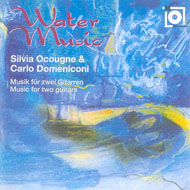
Water music
CD cover |
| Carlo Domeniconi - list of works |
 |
|
Op. 70 - 79 |
|
|
|
Opus 70 Sonata, quasi una sinfoni
(Berlin, 1994) 22 min.
Solo guitar. 4 movements. Written for Marco Socías who has performed it innumerable times.
Opus 71a Suite caratteristica
(Berlin, 1994) 12 min.
Solo guitar. Commissioned by Alexander Checkov. Frequently performed by him. Edition Margaux, Berlin.
Opus 71b Transformation (Sunayama henge)
(Berlin, 1994) 7 min.
Solo guitar. Written for Masayuki Kato. A pentatonic fantasy on a well-known Japanese folk song. “Sunayama henge” means transformation. Initially in the form of variations, the piece quickly develops its own form which is in places peaceful and meditative but with highly virtuosic passages. When the theme reappears towards the end a certain "transformation" is noticeable. The coda finishes the work in highly virtuosic form. Appears on the CD "Selected Works I".
Opus 72 Minha tia esotérica do Brasil (My esoteric Brazilian aunt)
(Berlin, 1994) 7 min.
Solo guitar. Written for Silvia Ocougne. Original title “Minha tia esoterica do Brasil”. Humorous folk piece. Performed very frequently by the composer. A lot of my own personal life is in this piece because ... my esoteric aunt loves the Brazilian evergreens ... my esoteric aunt loves it when, from time to time, music consists of nothing ... and of course my esoteric aunt loves Beethoven ... that is all.
Appears on the CD "Selected Works I".
Opus 73 Dirindillá (Concerto No. 9)
(Berlin, 1995) 34 min.
Double bass, guitar and strings. Performed by Yaz Baltacigil and the composer in Istanbul with the Istanbul Symphony Orchestra and broadcast on the radio. Performed again in 2008 in Izmir, Turkey, by Pinar Baltacigil and the composer. |
|
|
Opus 74 Pork pie variations
(Berlin, 1995) 20 min.
2 guitars. Variations on the blues piece “Goodbye, pork pie hat“ by Charlie Mingus. It has been performed many times by Silvia Ocougne and the composer, and in Spain by Marco Socías and the composer. Recorded on CD by the Bergerac Duo. In 2008 it was recorded by Silvia Ocougne and Carlo Domeniconi for the CD “Selected Works IV”. Edition Margaux, Berlin.
Opus 75 Juegos del viento
(Berlin, 1996) 11 min.
3 guitars. Andean character. Written for the Trio de Cologne, at that time Zoran Dukic, Laura Young and Marco Socías. Recorded for CD by the trio’s present line-up.
Opus 76 Serenata, (Concerto No. 10)
(Berlin, 1996) 32 min.
Concerto in 3 movements for guitar, strings, flute, clarinet, horn and bassoon. Written for Masayuki Kato.
Opus 77 Cuentos de Atlantida (Concerto No. 11)
(Berlin, 1996) 12 min.
Guitar, strings, bass clarinet, bassoon, contrabassoon and tubular bells. Commissioned by the Andres Segovia Festival in Madrid. Premiered by Pablo de la Cruz (Madrid) and the Gilbert Ensemble (London). In 1997 performed at the Kreuzberger Gitarrentagen by the composer and the Kammerorchester unter den Linden. Recorded by Pablo de la Cruz in 2000. It is based on themes by Manuel de Falla. Verlag Neue Musik, Edition Margaux, Berlin.
Opus 78 Canti d’amore del Nord d’Italia (Love songs of Northern Italy)
(Berlin, 1996) 22 min.
Alto voice and guitar. A collection of Italian folk poems collected by Pier Paolo Pasolini (Il canzoniere italiano). Performed frequently by Özlem Kaveller and the composer.
Opus 79 Terra
(Berlin, 1996) 11 min.
Large orchestra. Modal minimal piece. Publised by Verlag Neue Musik, Edition Margaux, Berlin. |
|
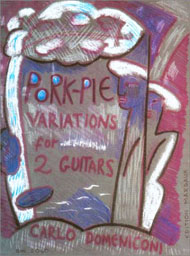
Pork pie variations
sheet music cover |
| Carlo Domeniconi - list of works |
 |
|
Op. 80 - 89 |
|
|
|
Opus 80 Illuminata
(Berlin, 1996) 6 min.
Solo guitar. The Latin title means “everything which is illuminated”. The idea of this piece came from the image of a soul fighting for inner beauty but hindered by the temptations of the sensual world. A very personal piece, which once again connects the old and the new worlds. In the programme of the composer. Recorded by the composer for the CD “Selected Works I”.
Opus 81 A step to Paradise
(Berlin, 1996) 5 min.
Solo guitar. Short piece, originally written for Lyona Boyd. A kind of jazz ballad mixed with old English elements (Dowland). Very often performed by the composer.
Opus 82 Tres Huaynos
(Berlin, 1996) 15 min.
Mandolin and guitar. Written for Peter Ernst.
Opus 83 Waiting for the tiger
(Berlin, 1996) 13 min.
Cello and button accordion. Contemporary tone language. Written for Matias de Oliveira Pinto und Claudia Buder, and performed by them in the BKA, Berlin.
|
|
|
Opus 84 El trino del Diablo (The Devil’s trill) (Concerto No. 12)
(Berlin, 1996) 84 min.
Solo violin, soprano, speakers, 2 guitars, violin, viola, cello, double bass, viola da gamba, accordion, piano, 3 percussionists. 12 musical pictures after the novel of the same name by Daniel Moyano.
It was premiered on the composer’s 50th birthday in the Passionskirche, Berlin. A year later it was performed in the Philharmonie Berlin, and in 1999 at the Istanbul Festival. CD and score published by Verlag Neue Musik, Edition Margaux, Berlin.
Opus 85a Ricercare
(Berlin, 1996) 8 min.
Violin and guitar. Written for Matthias Leupold (violin) and Il-Ryun Chung (guitar). Often played by this duo, e.g. in the Passionskirche, Berlin in 1997.
Opus 85b Tango
(Berin, 1996)
Violin and guitar. For Maren’s birthday.
Opus 86 Concerto No. 13 “Cuento Oriental”
(Berlin, 1997) 22 min.
Guitar and strings. 1 movement. Modal / oriental. This piece is dedicated to Marco Socías.
Opus 87a Zeitbruch (Time-break)
(Berlin, 1997) 6 min.
Flute and guitar. Medium degree of difficulty. Commissioned by a Swiss music school in Aarau.
Opus 87b Canzone e tango
(Berlin, 1997) 10 min.
Cello and piano. Easy to intermediate level didactic piece.
Opus 88 Toccata in blue
(Berlin, 1997) 7 min.
Solo guitar. Written for Dale Kavanagh and recorded by her on CD. A kind of homage to George Gershwin. Edition Margaux, Berlin.
Opus 89 Cinque Pezzi Brevi
(Berlin, 1997) 10 min.
4 guitars. 5 short pieces, written for the San Francisco Guitar Quartet. |
|
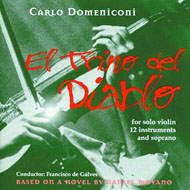
El trino del Diablo
CD cover
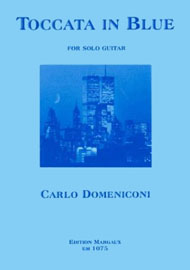
Toccata in blue
sheet music cover |
| Carlo Domeniconi - list of works |
 |
|
Op. 90 - 99 |
|
|
|
Opus 90 The bridge of the birds
(Berlin, 1998) 12 min.
Solo guitar. Dedicated to the Chinese guitar lecturer Professor Zhen-Gi in Peking. Virtuoso and pentatonic - melodic guitar piece with tremolo technique.
Opus 91a Fugenarbeitsphase (Fugue phase)
Opus 91b Fugue
(Berlin, 1998) 5 min.
4 guitars.In 4 parts. Concluding work of an extended fugue phase.
Opus 92 Präludium & Fuge (Prelude & fugue)
(Berlin, 1999) 15 min.
Solo guitar. Tuning C, A, d, g, a, e. Prelude in continuous eighth-movement with changing metrics.
Opus 93a Oyun
(Berlin, 1999) 12 min.
4 guitars or guitar ensemble. Sonatine in 3 movements in the Turkish style. Commissioned by the Musikschule Paderborn.
Opus 93b Oyun
(Berlin, 1999) 14 min.
2 guitars and string ensemble. Concertino in 4 movements. Treatment and expansion of the quartet Opus 93a.
Opus 94 Liederliches mit Musik (Text: Ernst Jandl)
(Berlin, 2000) 10 min.
High voice and guitar. Cycle of 7 songs, after Jandel’s “Laut und Luise“. Composed for Nora Buschmann.
Opus 95 Prelude & fugue No. 2 (G minor)
(Berlin, 2000) 7 min.
Solo guitar.
Opus 96 Prelude & fugue No. 3 (E minor)
(Berlin, 2000) 8 min.
Solo guitar. This piece, like Prelude & Fugue No. 5 (Op. 99), comes from a series of preludes and fugues which I wrote between 1999 and 2000 as a result of my ongoing preoccupation with counterpoint and its application on the guitar. The creation of these pieces owes less to the masterpieces of Bach than to the more recent attempts of the Russian composer Dmitri Shostakovich. This perhaps explains their slightly Russian character, particularly in the preludes.
The fugues have an unusual harmony, determined in large part by what is possible on the guitar. The fact that it is not possible to move freely forces the composition into often strange harmonic routes and expressions to which the ear seems unaccustomed. The cause of this can invariably be found in the fingerboard of the guitar. This can sometimes lead to utterly charming harmonic expressions which would never arise if selecting sounds simply by ear.
A fugue (in particular, one in four voices) will be possibly always a compromise between the will, or imagination, of the composer and the possibilities of the instrument. In the broadest sense, however, this is always the case. Recorded by the composer for the CD "Selected Works I".
Opus 97 Prelude & fugue No. 4 (B minor)
(Berlin, 2000) 7 min.
Solo guitar.
Opus 98 Sonata for guitar
(Berlin, 2000) 14 min.
Solo guitar. Sonata in 4 movements. Written for Alvaro Pierri who premiered it in Vienna for Jeunesse Musicale (2001).
Opus 99 Prelude & fugue No. 5 (B minor)
(Berlin, 2000) 9 min.
Solo guitar. As with Prelude & Fugue No.3 (Op. 96), this prelude is clearly dedicated to the great Russian composer. The fugue, also in four voices, has a strict exposition but goes on to use mere fragments of the theme in free form. The unity between the prelude and the fugue is strengthened by a re-burgeoning of the theme of the prelude at the end of the fugue. Appears on the CD "Selected Works I". |
|
|
| Carlo Domeniconi - list of works |
 |
|
Op. 100 - 109 |
|
|
|
Opus 100 Ricordando B.A.
(Berlin, 2000) 10 min.
Solo guitar. 3 movements with exotic tango character. Dedicated to Carlo Marchione who premiered it.
Opus 101 Long Island suite
(Berlin, 2000) 12 min.
2 guitars. 7 movements (Toccata, Corale Notturno, Sereno, Doloroso, Perpetuum, Molto lento, quasi statico, Finale). Commissioned by the Long Island Guitar Festival. Written for Pat Bianculli and Harris Becker. Contrasting motifs dovetail together to form a whole. For example lyrical Italian imitations of Bach arias and moments which are nearly "country". Real American !
It was recorded by the composer with Nora Buschmann for the CD "Selected Works III ".
Opus 102 Vidala
(Berlin, 2001) 6 min.
Solo guitar. Argentinian music reinvented. Dedicated to Ana Villa.
Appears on the CD "Selected Works II ".
Opus 102a Vidala
(Berlin, 2001) 6 min.
2 guitars. Commissioned by Juri Clormann. Identical to Opus 99.
Opus 103 Ten Aspects of a Bartók Theme
(Berlin, 2002) 12 min.
2 guitars. The Bartók theme is played something like a “Cantus Firmus” through 10 variations. As the title implies, these are not direct variations, but paraphrases of a theme from Bela Bartók‘s "Mikrokosmos" which does not appear in this composition. Written for Susanna Prieto and Alexis Mouzourakis.
It was recorded by the composer with Raphaella Smits for the CD "Selected Works III ".
Opus 104 Scaramouche
(Berlin, 2002) 25 min.
String quartet. Suite in the old style, as a baroque dance suite. Commissioned by the Dutch Eurythmy choreographer Rob Barendsma. Often performed in the Eurythmy project “Four Pieces”.
Opus 105 Sonata No.3 (Bachmann Sonata)
(Berlin, 2002) 14 min.
Solo guitar. 5 movements, After the poem cycle “Lieder auf der Flucht” (Songs in Flight) by Ingeborg Bachmann, written while she was a guest of Hans Werner Henze in Naples during the winter of 1954 - the coldest ever experienced there. The music seeks to represent the contrast between the southern warmth of the city and the harsh cold spell. This piece was originally written for the stage. The music exists in a triangular relationship with eurythmics and speech. Appears on the CD "Selected Works I".
Opus 106 Taqsim
(Berlin, 2002) 7 min.
Solo guitar. An improvisation after Arabic oud music. Written for Nora Buschmann, who recorded it for CD in winter 2002.
Opus 107a ... a la notte
(Berlin, 2002) 7 min.
8-string guitar solo. This nocturne was written for Josep Henriquez (Barcelona).
Opus 107b Sonata per mandolino
(Berlin, 2002) 15 min.
3 movements. Written for the mandoline virtuoso Caterina Lichtenberg. The two upper strings are tuned a tone lower.
Opus 108 Nada
(Berlin, 2002) 5 min.
Guitar ensemble. Commissioned by the Paderborn Guitar Festival 2002. Indian raga character. Easy to intermediate level.
Opus 109 Sieben Lieder nach Yunus Emre (Seven songs after Yunus Emre)
(Berlin, 2002) 22 min.
Deep voice and guitar. Language: old Turkish.Settings of original poems by the Sufi poet Yunus Emre (Konya, around 1200). |
|
|
| Carlo Domeniconi - list of works |
 |
|
Op. 110 - 119 |
|
|
|
Opus 110 Berlin, int hellet, int dunklet, in beedes (Berlin, in light, in the dark, in both)
(Berlin, 2002) 70 min.
Deep voice and guitar. 20 songs about Berlin from the time of the artist Heinrich Zille (1858 - 1929) until today.
Opus 111 Chaconnne
(Berlin, 2003) 13 min.
New production the Bachschen Chaconne. Same timing, same rhythm. Part of Dale Kavanagh’s concert programme. Premiered in March 2004 in Gevelsberg.
Opus 112 Thalisman
(Berlin, 2003) 12 min.
Viola and guitar. Commissioned by Donna Clark (Indianapolis). Work with strongly vital character and a long cadenza for viola solo.
Opus 113 Impromptu
(Berlin, 2003) 4 min.
Solo guitar. Late Romantic guitar piece written for Brigitte Zaczek. Tuning 5=G / 6=C.
Opus 114 Yi Jing (I Ching)
(Berlin, 2003) 23 min
Solo guitar. Modern guitar music in 7 movements with Chinese influence. The titles of the movements were chosen using I Ching sticks. The piece Yi Jing, I Ging or I Ching, was written for the Chinese virtuoso Yang Xuefei. Tuning: C-G-d-g-h-e.
Opus 115 Tenebrae
(Berlin, 2004) 11 min.
2 guitars. 3 movements (Quasi sarabanda, Come parlando, Quasi marcia funebre). Inspired by Paul Celan’s poem “Tenebrae”. The poet's deep desire for religious experience during the conditions prevailing under the Third Reich make it impossible for him to believe in a just God. Dark, mysterious, esoteric style. Commissioned by Thomas Kirchhof. Recorded by the composer with Raphaella Smits for the CD "Selected Works III ".
Opus 116 Prelude & fugue No. 6
(Berlin, 2004) 6 min.
A kind of prelude and fugue in which the fugue is contrasted very strongly with jazz elements.
Opus 117 Fandango oriental
(Berlin, 2004) 10 min.
2 guitars. A theme with progressively extreme emerging variations. The fandango is an old Spanish dance in lively three-four time originating in central and southern Spain, regions greatly influenced by Arab culture. Fandango Oriental consists of a 24-bar theme with 14 variations and a finale in which the theme is repeated. The sixth bar of the theme and of each variation has a repeated motif (C minor, F minor, G major). Premiered with Nora Buschmann in “El vino y la guitarra”, March 2004.
Recorded by the composer with Nora Buschmann for the CD "Selected Works III ".
Opus 118 Mutabor
(Berlin, 2004) 7 min.
Solo guitar. After the fairy tale “Caliph Stork”. Mutabor is the magic transformation word. Premiered by the composer in Hof, April 2004. Commissioned by Sin - Ichi Fukuda.
Opus 119 Dicen que el espiritu… siempre habla.
(Berlin, 2004) 10 min.
Solo guitar. Premiered at the Aahus Festival 2004. Inspired by a theatre play produced in Buenos Aires in 2002. Juan Falú, to whom the piece is dedicated, was also of the opinion that this title would be very suitable for a musical composition. |
|
|
| Carlo Domeniconi - list of works |
 |
|
Op. 120 - 129 |
|
|
|
Opus 120 Lamento
(Berlin, 2005) 14 min.
Saz and string quartet. Written for Kemal Dinc. Lamento is Italian for lament. Actually, there is a Turkish musical form known as AGIT (lament), but it is very difficult to pronounce as the G is silent and the I without a dot also presents an obstacle for Europeans. The piece moves between melancholic and very dramatic pictures. The Saz was given an extensive cadenza.
Opus 121 Til Phantasiens Moroe
(Berlin, 2005) 8 min.
Solo guitar. This title was written in golden lettering above the stage of the Helsingør Theatre in Aarhus, Denmark. It means ”for the joy of make-believe”. It is for my friend and prominent colleague Oscar Ghiglia, who is in himself a monument to the guitar. His theme during the courses he gave in Aarhus was always the meeting of orient and occident; the Moors and the crusaders. My piece deals exactly with this theme, and moves between pseudo-medieval Spanish and oriental.
Opus 122 Novas Giulianad
(Berlin, 2005) 7 min.
Solo guitar. Commissioned by the Mauro Giuliani Festival, a guitar festival near Bari, Italy. The theme was open and based on a Giuliani theme. In this case it is the second étude of Opus 48. As often in my works, the relationship between orient and occident is central. This idea came to me after learning that Giuliani himself was known as “Mauro“ (Moor).
Opus 123 Don Quijote (Don Quixote)
(Berlin, 2005) 14 min.
Solo guitar. This story has inspired several musicians. However this piece is not about fighting windmills, it deals rather with another aspect of Don Qioxote, who is here considered as a serious human being suffering from the effects of his time. The man from La Mancha, a Hidalgo (country nobleman), sees himself robbed of his ideals by the emergence of firearms, and therefore flees into his dream world. He dies in mental clarity.
Opus 124 Zwölf leichte Duos (Twelve easy duets)
(Berlin, 2005) 21 min.
2 guitars. The eternal theme - to produce beautiful music with few sounds - is …difficult!!! However, here is another attempt.
Opus 125 Hommage à Heitor Villa Lobos
(Berlin, 2005) 15 min.
Flute and guitar. Commissioned by the duo Oliver Fartach-Naini (guitar) and Thea Nielsen (flute). A sonata in 3 movements which frequently toys with the music of the Brazilian composer. The climax of the entire sonata is a quotation from the fourth Villa Lobos étude.
Recorded by the composer with Thea Nielsen for “Selected Works VI”.
Opus 126 Landscape
(Berlin, 2005) 6:30 min.
Solo guitar. Obligatory piece in the GA Competition 2006 in Canada. Very rhythmic, virtuoso piece. It has been described as “Americana”. Pulished by Edition Doberman.
Opus 127 Der gestiefelte Kater (Puss in boots)
20 min.
Accordion solo. Stage music in 12 movements.
Opus 128 Moon dew
(Berlin, 2006) 6:30 min.
Solo guitar. Obligatory piece in the Shanghai Competition 2006 (cancelled). Sonorous and romantic piece in a easy Chinese style.
Opus 129 The crazy rag doll tango
(Berlin, 2006) 3 min.
Flute solo. Composed for Kathy McDonald, as a small spiritual support during her temporary invalidity.
Opus 129a Aurora
(Berlin, 2006) 5 min.
Flute solo. Composed for Thea Nielsen. |
|
|
| Carlo Domeniconi - list of works |
 |
|
Op. 130 - 139 |
|
|
|
Opus 130 Sonata Berounka
(Berlin / Danzig, 2006) 24 min.
Violin and guitar. Sonata in 4 movements composed for Gabriela Demeterova and Pavel Steidl. Berounka is a fabulously beautiful river in the Czech Republic.
Opus 131 Bachianas novas
(Berlin, 2006) 10 min.
2 guitars. Written for Sergio and Odair Assad. As the title suggests, this is a homage to J. S. Bach and H. Villa Lobos who wrote the famous Bachianas Brasileirases. This piece in 3 movements has a form similar to that of Bach’s Italian Concerto for harpsichord.
Opus 132 Sogno furioso
(Bari, 2006) 10 min.
Dream piece. Childrens’ adventure dreams, wild and heroic. This piece in 2 movements was written in Bari and Rome for the Brazilian guitarist Cristina Azuma.
Opus 133 Basse Dance
(Berlin, 2007) 5:30 min.
Solo guitar. Originally a Renaissance dance which takes its name of the type of movement. The concept of Basse (deep) refers to the dance step, with the feet always on the ground.
Opus 134 Concerto Venezuelano (14)
(Casale Marittimo / Berlin, 2007) 21 min.
Guitar and string orchestra with piccolo, large flute and recorder. 3 movements. Highly virtuoso piece in Venezuelan folk style.
Opus 135 Se fossi là… sarei là
(Skryje / Berlin, 2007) 22. min.
Guitar and string quartet. 1 movement. Written for the guitarist Marco Socías.
Opus 136 Music for 4 guitars
(Berlin, 2007) 15 min.
A collection of smaller unconnected pieces for 4 guitars. Can be played in any sequence or number.
Opus 137 Three pieces for flute orchestra
(Berlin, 2007) 12 min.
Piccolo, 2 large flutes, 2 recorders, 1 bass flute. Can be played separately or as a suite. Reminiscent of old music.
Opus 138 Flute story
(Berlin, 2007) 11 min.
The flute as solo instrument tells a story – its own story.
Recorded by the composer with Thea Nielsen for “Selected Works VI”.
Opus 139 Suite festiva
(Berlin, 2007) 7 min.
4 guitars. Easy suite in 5 movements (gavotta, pavana, quasi alla turca, danza, marcia). |
|
|
| Carlo Domeniconi - list of works |
 |
|
Op. 140 - 149 |
|
|
|
Opus 140 Divertimento
(Berlin, 2007) 21. Min.
Guitar and piano. Written for Alvaro Pierri. 3 movements. Predominantly in the classic style.
Opus 141 Quartetto mistico
(Berlin, 2007) 12 min.
Guitar and string trio. 1 movement.
Opus 142 Bestiarium
11 min.
Solo guitar. A didactic work with humour. Using animal names (some invented) to help students understand particular guitar techniques.
Opus 143 Stream
(Berlin, 2007) 7 min.
4 guitars, Written for the Los Angeles Guitar Quartet (LAGQ). 1 movement. Very rhythmic. ABA form. Dominant timing is 4+4+5+4 eighth.
Opus 144 Elegia
12 min.
Commissioned by Gherardo. For viola pomposa.
Opus 144a Momenti per hydra
6 min.
Opus 144b Tre preludi
12 min.
Opus 145 Divertimento per flauto e chitarra
12 min.
3 movements, tonal, virtuoso.
Opus 146a Concerto per chitarra e archi
(2008) 21 min.
Concerto in 3 movements. Almost completely in 5/8 time. Peculiarity: each movement has the same theme. Written for the Izmir Festival 2008.
Opus 146b Concerto per chitarra e archi
(2008) 12 min.
1 movement. Mixture of Latin American and Turkish elements. Performed by Nora Buschmann at the Izmir Festival 2008.
Opus 147 Steidleriana
(2008) 6 min.
Solo guitar. Written for my friend Pavel Steidl, to suite is style. Technical craziness, overtone singing and numerous effects are the stuff of this piece.
Opus 148 Quintetto mistico
(2008) 23 min.
Guitar and string quartet. 1 movement. Free tonal.
Opus 149 Eine kleine Storchsuite (A small stork-suite)
(2008) 6 min.
Solo guitar. Three easy movements for beginners. |
|
|
| Carlo Domeniconi - list of works |
 |
|
Op. 150 - 156 |
|
|
|
Opus 150 Scott's piece (working title)
(2008) 13 min.
Solo guitar. Fantasy/Variations on an individual theme. Written for Scott Tennant.
Opus 151 Unreal_Dance (2 guitars)
(Greiffenberg, 2008) 11 min.
Dream dance in 5/8 time. For the duo Oliver Fartash and Song Ou.
Opus 152 Violinsonate (Violin sonata)
(Greiffenberg, 2008) 21 min.
Violin and guitar. Highly virtuoso piece. Has affinities with Indian music. Written for Thibault Chauvin.
Opus 153 Sonate für Violoncello und Gitarre (Sonata for cello and guitar)
(2008) 20.30 min.
Written for Matias Oliveira Pinto. Premiered in Lichtenstein, 2009.
Opus 154 Invenzioni
(Greiffenberg, 2009) 32 min.
12 duets for 2 guitars which demonstrate various aspects of counterpoint techniques.
Opus 155 Uzh i ya li moloda
16 min.
Solo guitar. Fantasy variations on a Russian folk theme.
Opus 156 Nam guitar solo
(Berlin / Greiffenberg, 2009) 12 min.
Suite in 4 movements. Written for Lily Afshar. |
|
|
| |
|
|
 |
|
|
|